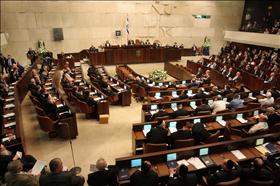Knesset 2014 Winter Session: Hiddush provides MKs with point-by-point analysis
Hiddush to Knesset: Voters Want Change
Hiddush Vice President of Research and Information Shahar Ilan provided all Knesset Members with Hiddush's detailed analysis of the 2014 Israel Religion and State Index. It's clear that the voters want change - but the Knesset has been dragging its feet.
02/11/2014 01:02
Tags:

Israeli Knesset in session
As the Knesset returned from recess last week, Hiddush- Freedom of Religion provided every Knesset Member with a detailed analysis of its recently released 2014 Israel Religion and State Index, touching upon seven of the most pivotal issues. Hardly any reforms on matters of religion and state were passed during the last Knesset session; and Hiddush noted that 80% of survey respondents were dissatisfied with the government's religion and state policies, including those pertaining to the ultra-Orthodox community.
It is anticipated that issues of religion and state will be a source of many political storms during this Knesset winter session, and a stark indication of what's to come has been the intense battle over the recent Conversion Bill, which exploded on the very first day of the resumed Knesset session. Despite Prime Minister Netanyahu’s opposition (due to his promises to the Ultra-Orthodox parties), and despite the opposition of the religious Zionist “Jewish Home” party, other coalition members presented the bill privately, and it passed the Knesset Constitution, Law and Justice Committee. The Chief Rabbis, of course, proclaimed that they would never recognize conversions performed according to the Bill.
Other religion and state issues highlighted in Hiddush's detailed analysis also beg the Knesset’s attention, as 66% of Israelis support civil marriage, 70% support public transportation on Saturdays, and 81% believe that ultra-Orthodox schools should be required to teach the core curriculum. The annual Religion and State Index is the most in-depth, systematic, periodical review of Israeli public opinion on all of these major issues of religion and state. Given the primacy of these matters in the Israeli public discourse and the political arena [see our "Hiddush election analysis"], and given the pressing and acute domestic conflict, Hiddush’s analysis of the findings of the 2014 Index, broken down according to party constituencies, is of particular importance. These findings provide the government an opportunity to review the Jewish public’s views on religion and state issues according to their political affiliations.
The challenges Israel faces regarding religious freedom come not from an antagonistic public. Rather, political opportunism prevents the progress that most Israelis would like to see actualized.
The challenges Israel faces regarding religious freedom come not from an antagonistic public, as evident from the 2014 Index. Rather, political opportunism prevents the progress that most Israelis would like to see actualized. Just last week, the Prime Minister once again began courting the Ultra-Orthodox parties, with an eye on future elections, disregarding the two thirds of Israelis and nearly 70% of Likud voters who prefer a governing coalition without them. Israeli activist organizations such as Hiddush strive tirelessly to address this gaping divide between the government’s stubborn opposition to progress and the will of the Israeli people, by extending our hands and building partnerships with Diaspora Jewish leadership, just as more than two-thirds of the Israeli public desires.
Together, we can actualize the vision of Israel’s founders, as voted upon unanimously by the first government on March 8, 1949 in its Basic Guidelines: “In the law that will serve as the foundation of the democratic, republican government of the State of Israel, full equality of rights and obligation will be guaranteed to all citizens, irrespective of religion, race, or nationality; freedom of religion, conscience, language, education, and culture will be guaranteed... The State will supply the public religious needs of its inhabitants, but will refrain from involvement in religious affairs...”
| |
All Voters |
Likud |
Yesh Atid |
Labor |
Jewish Home |
Haredi Parties* |
Center Left* |
| Support recognition of all categories of marriage |
66% |
64% |
93% |
97% |
36% |
11% |
97% |
| Support public transportation on Shabbat |
70% |
74% |
97% |
97% |
53% |
6% |
96% |
| Believe conscription law will not bring greater enlistment among yeshiva students |
61% |
53% |
60% |
44% |
69% |
87% |
75% |
| Support required core curriculum in ultra-Orthodox schools |
81% |
89% |
95% |
97% |
61% |
37% |
100% |
| Support making government benefits contigent upon realization of earning potential |
83% |
85% |
86% |
86% |
93% |
50% |
92% |
| Dissatisfied with Government's actions on religion and state |
78% |
66% |
80% |
83% |
52% |
91% |
83% |
| Support for governing coalition without ultra-Orthodox parties |
66% |
69% |
92% |
92% |
37% |
10% |
93% |
| Party Average |
72% |
71% |
86% |
85% |
57% |
42% |
91% |
*Haredi Parties includes Shas and United Torah Judaism, Center Left includes Meretz, Hatnuah and Kadima